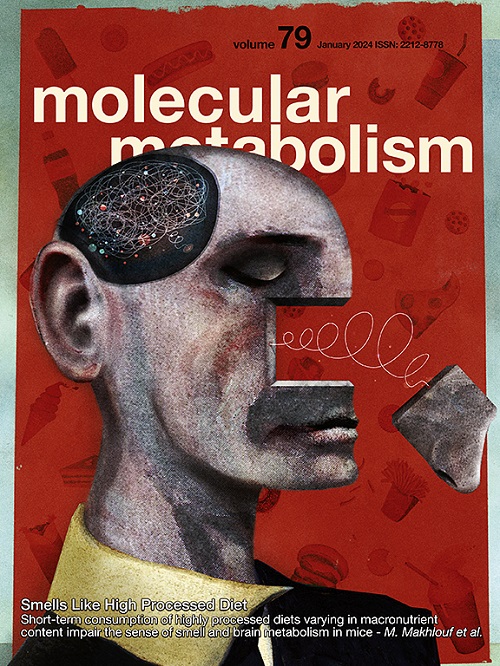耐力训练促进染色质关闭和及时抑制运动后立即早期应激反应。
IF 7
2区 医学
Q1 ENDOCRINOLOGY & METABOLISM
引用次数: 0
摘要
目的:众所周知,耐力训练可以引起骨骼肌的许多变化,以提高性能和功能。许多这些适应是由细胞核转录程序的调节控制的。虽然以前的研究已经探索了运动对DNA甲基化和组蛋白修饰的影响,但染色质重组和可及性的具体变化(转录的先决条件)仍然知之甚少。方法:采用多组学分析:采用atac测序方法,绘制运动后多个时间点(0h、6h和72h)耐力训练小鼠和非耐力训练小鼠分离的肌核染色质可及性。通过rna测序评估基因表达,基序活性分析确定了参与运动诱导的染色质重塑和转录组反应的调节因子。结果:耐力训练增强了运动后染色质的快速关闭,与未训练的肌肉相比,训练后的肌肉在运动后0小时和6小时表现出更明显的染色质可及性丧失。这些染色质可及性的变化在训练后的肌肉中持续时间更长,直到运动后72小时仍有显著的保留。即时早期转录因子,如Fos和Jun,在激活动力学中表现出训练状态依赖的转变。同样,在代谢、胰岛素反应和血管生成中也观察到特定的基因调节。结论:耐力训练触发肌肉中快速和持续的染色质重塑,促进运动的转录反应。我们的研究结果表明,训练会引起持久的表观遗传变化,可能会巩固肌肉记忆并提高生理弹性。这些关于肌肉适应分子机制的新见解有助于理解训练反应,并可能与疾病预防有关。本文章由计算机程序翻译,如有差异,请以英文原文为准。

Endurance training promotes chromatin closure and timely repression of the post-exercise immediate early stress response
Objectives
Endurance training is known to elicit numerous changes in skeletal muscle to enhance performance and function. Many of these adaptations are controlled by the modulation of transcriptional programs in myonuclei. While previous studies have explored alterations in DNA methylation and histone modifications in response to exercise, the specific changes in chromatin restructuring and accessibility, a prerequisite for transcription, are still poorly understood.
Methods
A multi-omics analysis was performed: ATAC-sequencing was used to map chromatin accessibility in myonuclei isolated from endurance-trained and untrained mice at multiple time points (0 h, 6 h, and 72 h) post-exercise. Gene expression was assessed via RNA-sequencing, and motif activity analysis identified regulatory factors involved in exercise-induced chromatin remodeling and transcriptomic response.
Results
Endurance training amplified rapid chromatin closing immediately after exercise, with trained muscle exhibiting a more pronounced loss of chromatin accessibility at 0 h and 6 h post-exercise compared to untrained muscle. These chromatin accessibility changes persisted longer in trained muscle, with significant retention until 72 h post-exercise. Immediate early transcription factors, such as Fos and Jun, showed a training state-dependent shift in activation dynamics. Similarly, specific modulation of genes involved in metabolism, insulin response and angiogenesis was observed.
Conclusions
Endurance training triggers rapid and persistent chromatin remodeling in muscle, contributing to the transcriptional response to exercise. Our findings suggest that training induces long-lasting epigenetic changes, potentially underpinning muscle memory and improved physiological resilience. These new insights into the molecular mechanisms of muscle adaptation help to understand the training response, and might become relevant in disease prevention.
求助全文
通过发布文献求助,成功后即可免费获取论文全文。
去求助
来源期刊

Molecular Metabolism
ENDOCRINOLOGY & METABOLISM-
CiteScore
14.50
自引率
2.50%
发文量
219
审稿时长
43 days
期刊介绍:
Molecular Metabolism is a leading journal dedicated to sharing groundbreaking discoveries in the field of energy homeostasis and the underlying factors of metabolic disorders. These disorders include obesity, diabetes, cardiovascular disease, and cancer. Our journal focuses on publishing research driven by hypotheses and conducted to the highest standards, aiming to provide a mechanistic understanding of energy homeostasis-related behavior, physiology, and dysfunction.
We promote interdisciplinary science, covering a broad range of approaches from molecules to humans throughout the lifespan. Our goal is to contribute to transformative research in metabolism, which has the potential to revolutionize the field. By enabling progress in the prognosis, prevention, and ultimately the cure of metabolic disorders and their long-term complications, our journal seeks to better the future of health and well-being.
 求助内容:
求助内容: 应助结果提醒方式:
应助结果提醒方式:


